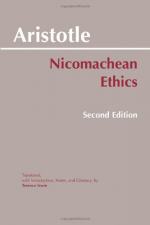
|
| Name: _________________________ | Period: ___________________ |
This test consists of 5 multiple choice questions, 5 short answer questions, and 10 short essay questions.
Multiple Choice Questions
1. A buffoon is described by Aristotle in IV.8 as someone who goes to extremes in order to make someone else do what?
(a) Laugh.
(b) Abjure the gods.
(c) Cry.
(d) Steal.
2. Aristotle states that one suffers injustice willingly in what situation?
(a) In situations of poverty.
(b) In no situation.
(c) In situations of sacrifice.
(d) In situations of judgment.
3. What causes a distortion to come about in most people, according to the opinion of Aristotle in III.4?
(a) The inactivity of the mind.
(b) The action of pain.
(c) The activity of the will.
(d) The action of pleasure.
4. What is the virtuous disposition most directly concerned, for Aristotle, with playfulness and humor?
(a) Pleasantness.
(b) Wisdom.
(c) Charm.
(d) Wit.
5. Aristotle says that the magnanimous man cares more for what than for people's opinions?
(a) Truth.
(b) Respect.
(c) Money.
(d) Fame.
Short Answer Questions
1. According to Aristotle, the highest good must be something that is what?
2. Deliberation is, for Aristotle, principally about the things to be done by whom?
3. What is a suitable category, in Aristotle's view, in which to place the feeling of shame?
4. What is demonstrated, in Aristotle's perspective, by the person who calmly bears misfortunes and sufferings?
5. Who is the worst person in the community in Aristotle's judgment?
Short Essay Questions
1. What sort of ruler becomes a tyrant, according to Aristotle's observations?
2. The magnanimous man is concerned with what things and in what manner, according to Aristotle?
3. Why is doing injustice worse than suffering injustice, from Aristotle's perspective?
4. What characterizes Aristotle's notion of the generous person?
5. What is the relationship that Aristotle cites as existing between opposites in coming to know what is or is not the right way for a thing to be, such as health?
6. What is Aristotle's distinction between the sort of injustice that is unlawful and the sort of injustice that is inequitable?
7. What characterizes Aristotle's distinction between "willing" and "choice"?
8. What is the distinction between the mean in the thing itself and the mean in relation to a man as Aristotle explains it?
9. What is the significance of the quasi-virtues mentioned by Aristotle in the last part of II.7?
10. In the view of Aristotle, what is the opinion of the temperate person towards the pleasures in which the intemperate indulge?
|
This section contains 950 words (approx. 4 pages at 300 words per page) |

|




